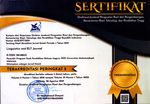The High School Learners` Instrumental Motivation and Its Correlation to the Their English Achievements
Abstract
Several studies have focused on extrinsic and intrinsic motivation and their impact on students’ learning progress. This study aimed to explore instrumental motivation and its relationship with English achievement among high school students. This correlational study was conducted at MA Al-Azhar Centre Baturaja with a total of 100 participants. A 20-item questionnaire containing 6 indicators of instrumental motivation was distributed to collect data. English certificate scores in odd semesters were used to record English achievement. Overall, students at MA Al-Azhar Centre Baturaja showed high motivation and good English achievement. Therefore, the overall results of the study confirmed that high motivation category is associated with good English performance. The analysis showed that there is a correlation between instrumental motivation of students at MA Al-Azhar Centre Baturaja and their English achievement. The analysis revealed a strong correlation (coefficient of 0.634, p< 0.05), supporting the acceptance of the alternative hypothesis and rejection of the null hypothesis.
Keywords
Full Text:
PDFReferences
N. A. Purmama, N. S. Rahayu, and R. Yugafiati, “Students` motivation in learning English,” Project, vol. 2, no. 4, pp. 539–544, 2019.
U. R. Swari, S. Masluha, I. N. D. K. Dewi, and W. N. Achmadin, “A Survey on the instrumental and integrative motivation among students in learning English,” Innov. J. Soc. Sci. Res., vol. 3, no. 2, pp. 4293–4301, 2023.
R. Fadillah, “Learning motivation and English achievement of students at Politeknik Negeri Semarang Central Java,” J. Penelit. Hum., vol. 15, no. 2, pp. 89–98, 2014.
F. G. E. Fandino, L. D. Munoz, and A. J. S. Velandia, “Motivation and e-learning English as a foreign language: A qualitative study,” Heliyon, vol. 5, pp. 1–7, 2019, doi: 10.1016/j.heliyon.2019.e02394.
R. Bambirra, “Motivation to learn English as a foreign language in Brazil,” Ling. em (Dis)curso, vol. 17, no. 2, pp. 215–236, 2017.
K. A. Shaaban and G. Ghaith, “Student motivation to learn English as a foreign language,” Foreign Lang. Ann., pp. 632–644, 2008, doi: 10.1111/j.1944-9720.2000.tb00932.x.
Y. Anggeraini and R. Nilawijaya, “The impact of motivation and collaborative learning on academic achievement,” J. Pendidik. Progresif, vol. 11, no. 2, pp. 235–245, 2021, doi: 10.23960/jpp.v11.i2.202108.
H. Tohidi and M. M. Jabbari, “The effects of motivation in education,” Procedia - Soc. Behav. Sci., vol. 31, pp. 820–824, 2012, doi: 10.1016/j.sbspro.2011.12.148.
C. L. Knoll, “The relationship between motivation and reading comprehension,” Grand Valley State University, 2000.
O. Dölek, “The realtionship between listening motivation and frequency of listening strategy use,” Int. J. Educ. Lit. Stud., vol. 10, no. 2, pp. 2–8, 2022.
A. Nasrollahi-mouziraji and P. Birjandi, “Motivational beliefs, self-regulation and EFL listening achievement: A path analysis,” J. Teach. Lang. Ski., vol. 35, no. 3, pp. 91–118, 2016.
P. Li and G. Pan, “The relationship between motivation and achievement -A survey of the study motivation of English majors in Qingdao Agricultural University,” English Lang. Teach., vol. 2, no. 1, pp. 123–128, 2009.
S. Ningrum and S. A. Matondang, “The correlation between students` motivation and achievement in reading comprehension,” Int. J. Soc. Sci. Humanit. Invent., vol. 4, no. 7, pp. 3636–3639, 2017, doi: 10.18535/ijsshi/v4i7.10.
N. M. Takaloo and M. R. Ahmadi, “The effect of learners’ motivation on their reading comprehension skill: A literature review,” Int. J. Res. English Educ., pp. 10–21, 2017.
E. Schaffner and U. Schiefele, “The contributions of intrinsic and extrinsic reading motivation to the development of reading competence over summer vacation,” Read. Psychol., vol. 37, no. 6, pp. 917–941, 2016, doi: 10.1080/02702711.2015.1133465.
D. Purwanti, H. Puspita, and Mulyadi, “The correalation between English learning motivation and English proficency achievement of the English study program students,” J. English Educ. Teach., vol. 2, no. 2, pp. 68–82, 2018.
M. N. Aisyah, J. Mistar, and I. W. Karimullah, “Correlation between EFL students` learning motivation and their English proficiency at University of Islamic Malang,” JP3, pp. 1–10, 2023.
Z. Šišková, “The relationship between receptive and productive vocabulary of Slavic EFL learners,” Top. Linguist., vol. 17, no. 2, pp. 26–40, 2016.
E. T. Agustina, A. Y. Wahyudin, and A. A. Pratiwi, “The students’ motivation and academic achievement at tertiary level: A correlational study,” J. Arts Educ., vol. 1, no. 1, pp. 29–38, 2021, doi: 10.33365/jae.v1i1.33.
N. S. C. Issabell, I. Zulkarnain, and S. Prihatini, “The correlation between students motivation and their achievement score in English learning,” Excell. J. English English Educ., vol. 1, no. 1, pp. 47–51, 2021.
E. Tiara, I. Supardi, and U. Salam, “The correlation between students’ motivation and English learning achievement,” J. Pendidik. dan Pembelajaran Khatulistiwa, vol. 8, no. 1, pp. 1–9, 2017.
N. A. Purmama, N. S. Rahayu, and R. Yugafiati, “Students` motivation in learning English,” Project, vol. 2, no. 4, pp. 539–544, 2019.
U. R. Swari, S. Masluha, I. N. D. K. Dewi, and W. N. Achmadin, “A Survey on the instrumental and integrative motivation among students in learning English,” Innov. J. Soc. Sci. Res., vol. 3, no. 2, pp. 4293–4301, 2023.
R. Fadillah, “Learning motivation and English achievement of students at Politeknik Negeri Semarang Central Java,” J. Penelit. Hum., vol. 15, no. 2, pp. 89–98, 2014.
F. G. E. Fandino, L. D. Munoz, and A. J. S. Velandia, “Motivation and e-learning English as a foreign language: A qualitative study,” Heliyon, vol. 5, pp. 1–7, 2019, doi: 10.1016/j.heliyon.2019.e02394.
R. Bambirra, “Motivation to learn English as a foreign language in Brazil,” Ling. em (Dis)curso, vol. 17, no. 2, pp. 215–236, 2017.
K. A. Shaaban and G. Ghaith, “Student motivation to learn English as a foreign language,” Foreign Lang. Ann., pp. 632–644, 2008, doi: 10.1111/j.1944-9720.2000.tb00932.x.
Y. Anggeraini and R. Nilawijaya, “The impact of motivation and collaborative learning on academic achievement,” J. Pendidik. Progresif, vol. 11, no. 2, pp. 235–245, 2021, doi: 10.23960/jpp.v11.i2.202108.
H. Tohidi and M. M. Jabbari, “The effects of motivation in education,” Procedia - Soc. Behav. Sci., vol. 31, pp. 820–824, 2012, doi: 10.1016/j.sbspro.2011.12.148.
C. L. Knoll, “The relationship between motivation and reading comprehension,” Grand Valley State University, 2000.
O. Dölek, “The realtionship between listening motivation and frequency of listening strategy use,” Int. J. Educ. Lit. Stud., vol. 10, no. 2, pp. 2–8, 2022.
A. Nasrollahi-mouziraji and P. Birjandi, “Motivational beliefs, self-regulation and EFL listening achievement: A path analysis,” J. Teach. Lang. Ski., vol. 35, no. 3, pp. 91–118, 2016.
P. Li and G. Pan, “The relationship between motivation and achievement -A survey of the study motivation of English majors in Qingdao Agricultural University,” English Lang. Teach., vol. 2, no. 1, pp. 123–128, 2009.
S. Ningrum and S. A. Matondang, “The correlation between students` motivation and achievement in reading comprehension,” Int. J. Soc. Sci. Humanit. Invent., vol. 4, no. 7, pp. 3636–3639, 2017, doi: 10.18535/ijsshi/v4i7.10.
N. M. Takaloo and M. R. Ahmadi, “The effect of learners’ motivation on their reading comprehension skill: A literature review,” Int. J. Res. English Educ., pp. 10–21, 2017.
E. Schaffner and U. Schiefele, “The contributions of intrinsic and extrinsic reading motivation to the development of reading competence over summer vacation,” Read. Psychol., vol. 37, no. 6, pp. 917–941, 2016, doi: 10.1080/02702711.2015.1133465.
D. Purwanti, H. Puspita, and Mulyadi, “The correalation between English learning motivation and English proficency achievement of the English study program students,” J. English Educ. Teach., vol. 2, no. 2, pp. 68–82, 2018.
M. N. Aisyah, J. Mistar, and I. W. Karimullah, “Correlation between EFL students` learning motivation and their English proficiency at University of Islamic Malang,” JP3, pp. 1–10, 2023.
Z. Šišková, “The relationship between receptive and productive vocabulary of Slavic EFL learners,” Top. Linguist., vol. 17, no. 2, pp. 26–40, 2016.
E. T. Agustina, A. Y. Wahyudin, and A. A. Pratiwi, “The students’ motivation and academic achievement at tertiary level: A correlational study,” J. Arts Educ., vol. 1, no. 1, pp. 29–38, 2021, doi: 10.33365/jae.v1i1.33.
N. S. C. Issabell, I. Zulkarnain, and S. Prihatini, “The correlation between students motivation and their achievement score in English learning,” Excell. J. English English Educ., vol. 1, no. 1, pp. 47–51, 2021.
E. Tiara, I. Supardi, and U. Salam, “The correlation between students’ motivation and English learning achievement,” J. Pendidik. dan Pembelajaran Khatulistiwa, vol. 8, no. 1, pp. 1–9, 2017.
DOI: https://doi.org/10.31764/leltj.v12i2.27847
Refbacks
- There are currently no refbacks.
Copyright (c) 2024 Yentri anggeraini, Novarita Novarita

This work is licensed under a Creative Commons Attribution-ShareAlike 4.0 International License.
_____________________________________________________
Linguistics and ELT Journal
p-ISSN 2339-2940 | e-ISSN 2614-8633

LELTJ is licensed under a Creative Commons Attribution-ShareAlike 4.0 International License.
_____________________________________________________
LELTJ is abstracting & indexing in the following databases:
_____________________________________________________
LELTJ Editorial Office:













